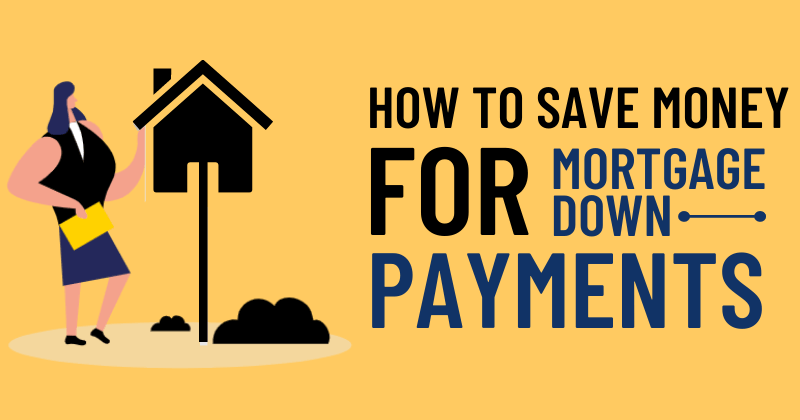How To Save Money For Mortgage Down Payment

This article may contain affiliate links. If you make a purchase using my links, I’ll earn a small commission at no extra cost to you. I appreciate your support!
Are you ready to purchase a house? But confused about how much money to put down as your mortgage down payment and how to go about saving money for the down payment.
Don’t worry, in this guide, you will learn exactly what you should be doing to save money for the down payment. Even if you don’t have any savings as of this moment, chill, and drink a beer; as long as you follow the steps in this blog post, I’m sure you’ll have enough for the mortgage down payment.
Can You Buy A House With No Down Payment?
You can buy a house with no down payment. But that doesn’t mean you should! If you’re not putting money into the down payment it means you don’t have enough money, in such cases buying a house right now isn’t an ideal option for you.
Save up some money, create an emergency fund, then pay your down payment and buy a house. No down payment means a larger loan, more interest to pay, and more risk to carry on.
It’s always best to save money first then buy a house using the saved-up money as your mortgage down payment.
How To Afford A Mortgage Down Payment In 5 Simple Steps
Step 1: Finalize Your Down Payment Savings Amount
You need to ask yourself three questions if you are serious about buying a house on a loan.

1. When am I planning to buy the house?
Are you moving to the new house in the next 6 months or 6 years? Figure out the when so you have a deadline to get to. This will help you to make budgeting plans to reach your goals within the allotted time.
If you need the house now, do you have enough saved for the mortgage down payment? If yes, then proceed. If no, make a deadline, say 7 months from today. Then move on to the next question.
2. How much money do I need to save up for the mortgage down payment?
If you have followed Dave Ramsey for some time, you know he and his team love to pay cash 100%.
I’m sure 90% of the population (including me) can’t do that right now, it’s too much right? Then what’s the right amount for the down payment?
In most countries, it is essential to put down at least 3% of the home’s value as a down payment. In 2019, the National Association of Realtors found that the average down payment on a house for first-time homebuyers is 6%.
According to Housing.com, a down payment on a house for a first-time buyer should be anywhere from 30% – 40% of the entire loan amount.
If you’ve been told that a 20% down payment is ideal, you are on the right track. Here’s my piece of advice on how much you should save – As Much As You Can.
You aren’t getting a loan at no extra cost, lending companies are solely trained to extract extremely high-interest amounts from you when they lend you cash.
The last thing you want to do is fall into a debt trap and end up paying more in interest than you ever did.
Never go below 10%, because the less you give as a down payment, the more you’ll suffocate paying interest for 10, 20, or 30 years.
3. How fast can I save the required amount and more?
You know when you are going to buy a house, you know how much down payment you need to start the process, now you need to structure a blueprint that will ensure you hit your targets on time.
Let’s say you will be buying a house in 3 months and you need $12,000 saved for a down payment – assuming you have already saved up $6,000, you need to save $2,000 a month for 3 months straight.
If you’re starting from zero, that means you need to save $4,000 a month from today to read $12,000 in 3 months.
I have specified the word ‘more’ in the question, now that’s for your day-to-day expenses, your emergency expenses. So if $12,000 is your down payment amount, hit $15,000 (more or less) then buy a house.
If this seems too much, postpone the purchase to 6 months or more but don’t reduce your down payment amount. It will make things easier now but you’ll end up paying up way more in the future.
Step 2: Cut Down Your Expenses
Here’s the fun part, now you’ve got to be careful while spending. First, understand how much you bring home, then find out how much is left after all your expenses. Is that a HUGE number? I’m sure it is!
When you don’t budget and spend whenever you feel like it, you overspend 99.9983% of the time.
If you’re struggling with saving money each month, you must try The No Spend Challenge. I’m confident that if you follow the steps and rules of the no-spend challenge, saving money will be easy.
You’re not a maniac or an idiot or a stupid impulsive buyer, you’re just an ordinary person who never made the effort to learn personal finance. It’s fine, it is.
Let’s look at a few ways you can save money
- Buy Clothes once a year
- Don’t eat out twice a week
- Ditch expensive brands
- Don’t buy a new car
Follow these 4 tips and you will make some money. Here are two articles that will surely benefit you (especially if you are struggling with cutting expenses)!
Now that you have got a clear picture of 52 money-saving ways, let’s see how you can save money for the down payment in the fastest way possible.
Step 3: Start Part-Time Jobs
Remember how we spoke about accumulating money for the down payment in the fastest way possible? Well, take a part-time job and work for a few more hours (at least till you make your money).
You could also do side hustles to make extra income but side hustles are usually your bootstrap business, you may make money or you may not make any money.
I’m sure buying a house is a serious investment, one that you may not want to leave to chance.
Here are some examples of part-time job ideas –
1. Car Salesman – Sales is the most lucrative job you can find on earth. But you better know how to sell, at least the basics of being persuasive can help you a lot. Also, the commission you can earn through cars is much more than most other sales commissions.
2. Sports Coach – Do you love to play sports? Are you the guy who’ll play all day without getting tired? Being a sports coach pays off well, in monetary terms as well as in happiness terms.
3. Receptionists – Receptionists are great multi-taskers. If you like being on your toes and working on multiple things at once, get ready to earn and learn valuable receptionist skills.
4. Tutor – Google online teaching jobs and you’ll find plenty of sites paying high hourly rates. If you like teaching offline, take a look at your neighborhood, I’m sure you will find a few classes where your subject skills will be necessary.
Don’t know what part-time jobs suit you best? – 22 Part-Time Job Ideas
Part-time jobs always pay, but if you think you can start a money-making side hustle, don’t think too much, just go for it.
I’ll also link my article on the best side hustles if that’s the road you wish to take.
You probably work for 8 hours a day, sleep for 7 hours a day, do household chores for 3 hours, and travel for 2 hours. You still got 4 hours for a part-time job.
If you compromise on your sleep, take those 3 hours and get all the work done in 1 hour (if possible), you’re looking at an additional 4 hours which you can use to work another part-time job.
Sound extremely tough? Yeah, it is tough, it’s very tough. But if you need something, you have to sacrifice. Two part-time jobs and one full-time job will easily boost your income by 70%.
Combine it with your frugal habits and I can see you have twice or thrice the amount you need for the down payment.
Step 4: Prioritize Debt Repayment
Now that you have all this money, let’s put it into use. Sit down and add up all your debts – credit cards, loans, friends and family, etc.
Then with the excess money you have at the bank (part-time jobs and main job), pay it off completely.
Those debts you have are probably not as big as your house loan but can cause problems cause you now have a new form of debt (that’s HUGE). So pay off your credit cards, and any other debt immediately.
Debt Snowball is a great strategy to pay off debt fast, here’s a detailed article by Dave Ramsey on Debt Snowball. Read it nicely, follow the steps, and get rid of any existing debt. Once you do that, let’s do the final step.
Step 5: Temporarily Limit Market Investments
Investing in the stock market is a crucial step to financial success as it lets your money make more money; yes everyone should invest their money.
If you’re putting away 10 or 30% of your income in mutual funds, stocks, gold, and bitcoin, keep that on hold and put that money for your mortgage.
The same logic goes for your retirement account. You need to start putting money towards your retirement account for your life after retirement. So for a temporary period consider diverting your funds for that mortgage down payment you’ll be needing.
It will affect your retirement account growth but it’s only for a temporary period. Once you pay the down payment for the house, get right back to those retirement payments religiously.
Let’s say you made a budget, followed it religiously, and started working part-time, so you’re making more income.
You used that money to get rid of existing debts, limited investing, and retirement account savings too if you had less or no debt in Step 4, I’m sure you have a lot of money saved up in that bank account.
Here’s what I need you to do – Fill up your emergency fund account (if you have, skip this point), then save 15% more than you budgeted in your savings account.
Put all the excess cash into your mortgage down payment.
You may have planned to put down 15% of the total loan amount, but if you have more money at your disposal after doing all the above things, put up everything for the house. Overall you will be paying a lower interest amount.
How Much Should You Put Towards Your Mortgage Payments?

Your mortgage payment needs to be consistent, paying too much cash one month and not being able to pay the minimum the next month is simply not acceptable, unless you want the bank to charge you penalty fees :).
First try to hit the monthly payments consistently, if you can do that and you still have some cash left each month, pay it to them.
Don’t get overexcited and throw all your money into mortgage payments, go slow and consistently increase your monthly payments.
People who get too excited about paying debt fast reach a point where they hate paying debt and eventually fall into much deeper debt problems like taking a new debt to cover the old debt.
Of course, you don’t have to literally go all-in with mortgage payments, you need to maintain some money in the following accounts for safekeeping:
Emergency Fund
3 to 6 months of expenses is a great start for your emergency fund. If you’re buying a house, never do it without an emergency fund, sooner or later you will regret not having one.
Buying a house is a big expense, most probably the biggest on your list. So you need to be financially prepared to handle any obstacles with ease. An emergency fund will help you do just that.
Savings Account
You don’t need to have a lot of money in your savings account, 10-15% more than your budgeted amount should be good. Allocate the rest for your payments.
Some people save 30% more in savings, you can do that but I don’t think you should because you already have an emergency fund to protect you in times of uncertainty and if you have budgeted accurately, trust me you don’t need that much extra cash, give it to your lender and make your life debt-free sooner.
I also suggest you stick to a max of 20 years mortgage.
Some companies charge you lower interest rates and increase the loan term. Don’t fall into such traps, a longer loan term will call for more trouble.
Credit Score: An Important Factor To Consider
The credit score is the most important factor in deciding the interest rate you will be charged. Truly care about your money? Start working on your credit score right now!
The 5 steps I’ve given you are good and they’ll help you save money, and develop good money habits but if you don’t have a good credit score, you will be charged extremely high interest rates.
The last thing you want to do is pay more money for something you could have easily gotten for less.
That’s why Step 4 is all about paying off debts, by doing that you are basically telling the lending institutions that you are a good debt payer and they will boost your credit score.
How To Improve Your Credit Score
Pay all past-due balances
Past debts? Pay it off today, max to max tomorrow. If you don’t have the money to pay it off, work more, earn more, then pay it ASAP.
Avoid applying for credit cards
If you don’t have a credit card, apply for one because there will be no credit score if you don’t use a credit card, right? If you already have a card, avoid buying new ones, it won’t help.
Check your credit report and raise queries
From time to time check your credit report. If you find any discrepancies, report them to the credit authority and see a positive rise in your credit score.
Avoid taking debts if you can’t pay them
It’s best to avoid additional debts in such circumstances, you are about to take on a huge debt, it’s best if you hold your urge to take on more debt and financially mess up your life.
Increase your credit limit
This is a trick but it works quite well. Go to your bank and tell them to increase your credit limit, your credit score is a percentage of your total limit. By increasing the limit you may increase your credit scores quickly.
But wait, if you are a person who has no control over spending habits, better not try this trick. A higher limit will excite you to spend more money – that’s not our goal here!
When To Buy A House On Mortgage?

Before we start with whether you should buy a house on a mortgage or not, I want to ask you if you want to buy a house. I mean are you willing to stay in that house for at least 2 years?
I would recommend you try making economic sense of the situation. Is it more affordable to rent or buy a house? If you could rent a house that looks just like the house you loved for cheaper, it’s logical to go the renting route.
But deciding whether to rent or buy a house doesn’t only depend on logic, right! House has an emotional connection to it.
If buying a house is still on your top priority list in 2025 or the coming years, here are a few pointers to help you decide when you should buy a house on a mortgage.
Evaluate Interest Rates
Keep an eye on those interest rates. Avoid signing a mortgage agreement when the rates are high and when you feel the rates are lowered, go get that loan signed off.
Make Sure You Have Enough Income
Like I said in the beginning, purchasing a home is one of the biggest investments you will ever make, you’ve got to be prepared for it.
Purchasing a house is like a battle, if you don’t prepare for war, you are bound to face defeat. Make more money, save enough, and live a frugal lifestyle for a few years till you knock out the house loan off of your house!
Choose The Right Time Of The Year
Home prices fluctuate a lot! If you’re wondering why they fluctuate, it’s mainly due to demand and supply in the real estate market.
More demand for properties, higher prices, more supply but less demand, lower prices, and so on. Be smart, keep on calling your real estate friends and ask them about house prices.
When you see a dip, take your money bag and run to grab the offer at the best price. When prices are low, speed is all that matters, because everyone now wants to buy at low rates.
Talk to your lender in advance, and tell them you’ll be expecting money from them soon. When low interest rates and low house prices meet together, you go GodSpeed!
Have A Good Credit Score Before Applying For A Loan
If you are suffering from a bad credit score, don’t run for a loan. First, improve your scores, be consistent with it for a few months then apply for a loan.
Are You Emotionally Ready?
Purchasing a house is an emotional decision. So the final point I want you to think is “Are you emotionally ready?”
Is It Smarter To Pay Off Debt Or Save For A Down Payment?
The most rational thing to do is paying off debt first then saving for the down payment and purchasing a house. Why? Because when you have a house loan on your shoulder, you don’t want any other financial burden at the same time.
Even if it takes you a few more months to save for a down payment, that’s fine. Your financial well-being is your first priority and according to that paying off that debt is the best approach.
A mortgage calculator is useful when you want to calculate multiple monthly payment combinations and figure out which payment method works best for your needs.
Keep in mind the increase in interest rates and choose a time frame that doesn’t take too much interest out of your pockets.
In addition to this, you may also incur other costs. Maintain a strict budgeting plan to ensure you have money at all times, for your current expenses as well as your future and unexpected expenses.
Saving For A Down Payment
Make extra payments along the way to get debt-free faster. The faster you get out of debt, the sooner you’ll reach financial freedom.
Debt is dangerous, Your House is beautiful, get a house, pay off your home loan, and live happily. That’s the success mantra I’ll suggest you follow.
Do you have any mortgage down payment questions to ask? I’ll be waiting for you in the comments.
Have you enjoyed this post? If so, you might want to subscribe to my newsletter. It usually contains life lessons and money-related topics, some interesting observations, links to articles or books I’ve read, and tips to be a better person. If you’re interested in these things then subscribing will be simply wonderful 🙂 PS: Subscribe and Get your Freebie below!
Also, I’m a YouTuber now! If you’re interested in Pinterest Marketing, Blogging, or business-related things, Subscribe to my Channel and I’ll see you in the comments!